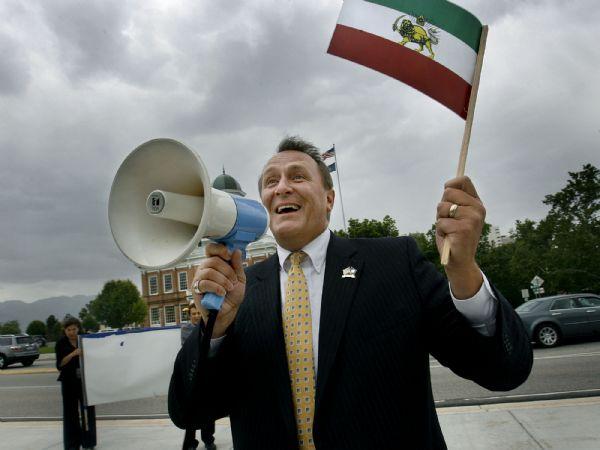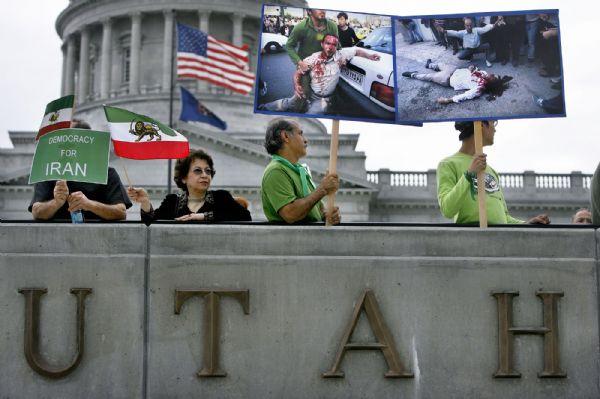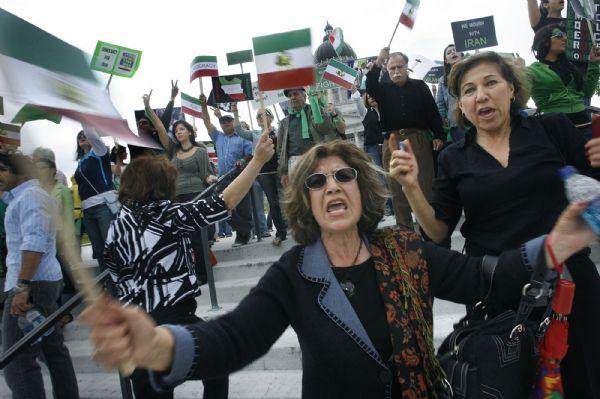This is an archived article that was published on sltrib.com in 2009, and information in the article may be outdated. It is provided only for personal research purposes and may not be reprinted.
For Javad Bagbani, the pictures and words seeping out of Iran this week are all too familiar.
In 1979, Bagbani, then 24 years old, marched through the streets of Iran when the shah's regime collapsed in the Islamic revolution.
"When I saw today's news, I said, 'history is repeating itself,' " said Bagbani, who now lives in Sandy. "Somebody kills your friends, you can [survive]. Somebody kills your family members, you can live. But when it comes to personal freedom, if you can't talk or think or just have basic rights, then you explode."
Bagbani, along with a couple of hundred others marched from the Salt Lake City and County Building to the Capitol on Saturday to show their support for Iranians, who have been protesting a June 12 election that they say was rigged to keep President Mahmoud Ahmadinejad in power. Utah Attorney General Mark Shurtleff briefly spoke in support of the protesters, who wore green headbands, clothes or wristbands, when they reached the Capitol.
They gathered to protest both the election and the treatment of protesters in Iran, where much communication with foreign media has been blocked. At least seven people have died and others have been wounded, according to the Associated Press. Protests continued in Iran on Saturday despite warnings from the country's highest authority, Supreme Leader Ayatollah Ali Khamenei, to desist.
Those who gathered in downtown Salt Lake City on Saturday said they did so to show support for friends, family and the democratic process.
"People in Iran are hearing about all the rallies happening across the world, and I think it's giving them a lot of support," said Sohrab Mirmontazeri, a 24-year-old Iranian-born filmmaker who lives in Salt Lake City. He organized the rally Saturday and a rally at the Capitol on Wednesday.
He and others said they decided to protest despite the Ayatollah's insistence that the Iranian election was legitimate.
"After 30 years of oppression, the situation in Iran and this rhetoric are not compatible," said Zohreh Taher, 48, an Iranian born Draper woman who attended the rally. "People have had it, and they don't care what he says."
Reza Tatabaei, 72, said he wanted to protest to make sure Americans know what's going on in his home country. Tatabaei said he was imprisoned in Iran for a decade for his political views. He said he escaped and sought asylum in the U.S.
"I want my homeland to be free," Tatabaei said in Farsi, as translated by his niece. "The people in the Iranian government are not a representation of the Iranian people."
The protesters, some with tape over their mouths to represent the silencing of Iranians and others holding photos of bloodied protesters, chanted "United for democracy!" as passing drivers honked in support.
Bagbani said Iranians now, as in 1979, are taking a great risk by marching in Iran. But he said they're beyond fear.
"You don't even think," Bagbani said. "You're numb because you are so mad and so angry. You think, 'So what if I'm alive? [Nothing has changed], so let's march.'"
lschencker@sltrib.com" Target="_BLANK">lschencker@sltrib.com







